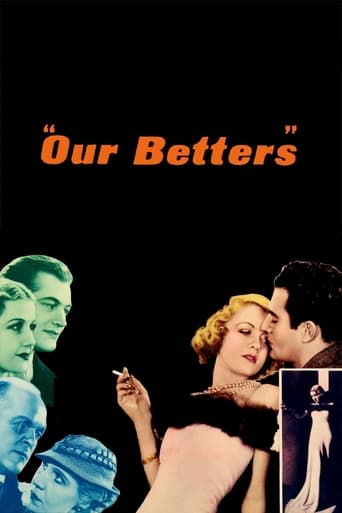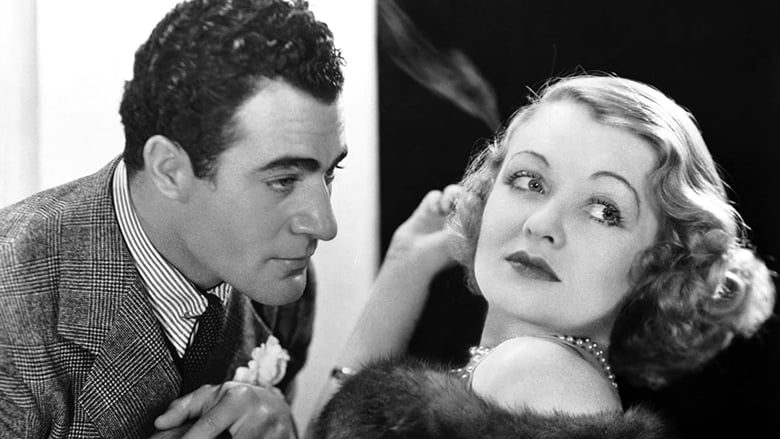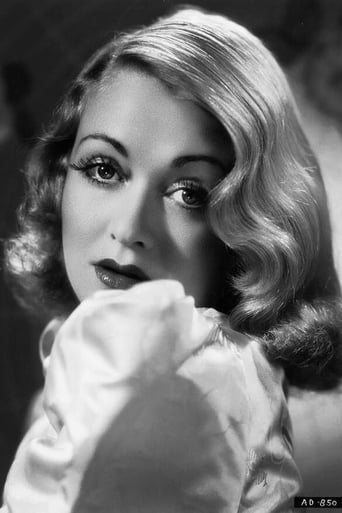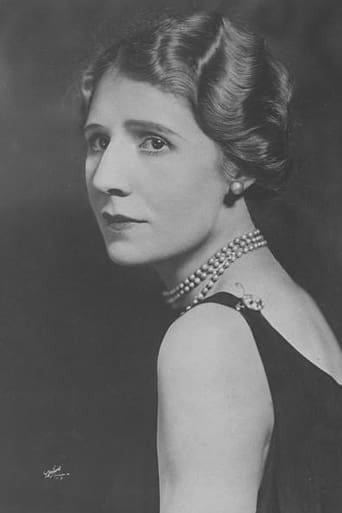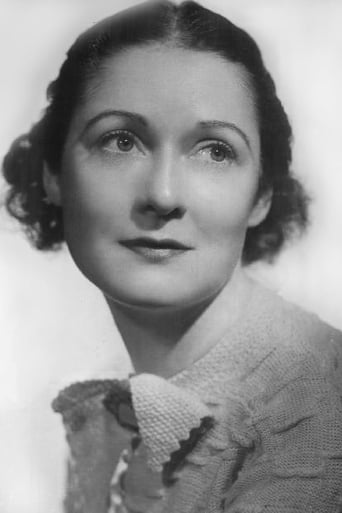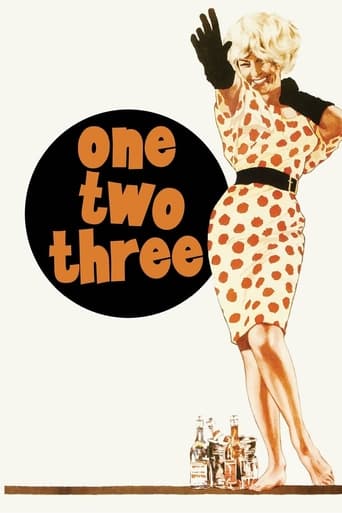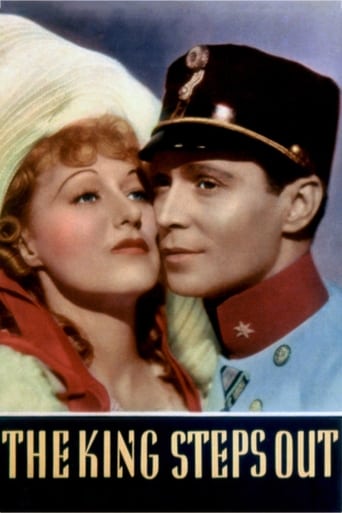Our Betters (1933)
Soon after being wed, American heiress Lady Pearl Grayston realizes her husband has married her for her money and is keeping a mistress. The two maintain a loveless marriage, a trade-off Pearl accepts in order to gain admittance to her husband's aristocratic social circle. While Pearl pursues her own affair with gigolo Pepi D'Costa, her visiting sister, Bessie, arrives and is appalled when Pearl's arrangement is revealed.
Watch Trailer
Free Trial Channels
Cast


Similar titles
Reviews
Very well executed
Self-important, over-dramatic, uninspired.
Excellent, a Must See
This is a must-see and one of the best documentaries - and films - of this year.
Pearl is a rich American who is marrying into British royalty. However, on her wedding night, she learns that her husband has no interest in her--just her money. And, he has a lover. So, instead of leaving him and asking for an annulment, she decides to dive into the decadent lifestyle of these idlers. She flaunts morality and lives for fun and her own sexual conquests. All in all, her friends are a very vacuous crowd.At first, I thought all this was quite interesting and a nice commentary about the British aristocracy. However, after a while it all began to drag because the film was so very talky and mannered. Too many people talking as if they are in an amateur acting class on 'let's do British accent day'. All in all, it became a bore and lost me. One of the worst of these silly performances was by Duchess Minnie (Violet Kemble Cooper)--and it often lacked realism. Of course, this could also be said about several others in this dull film. Yes, it has its moments--but not nearly enough to make it worth seeing--even the chance to see Ernest near the end of the film!By the way, about a decade after this film, Bennett and Gilbert Roland (who was also in this film) were married. They made two films together--both in 1933--"Our Betters" and "After Tonight".
The pre-code Hollywood film "Our Betters" deals with an idle set of upper-crust society types who while away their time with teas, card games, and gossip. While sipping hot cha, they chat about their sexual dalliances, discarded spouses, and kept lovers. Based on a play by Somerset Maugham, the well-written dialog is often ripe and bitchy, and a fine cast, headed by Constance Bennett, makes the lighter-than-air fluff more entertaining than it should be.If that were the sum total of "Our Betters," then the film would be a harmless entertainment, viewed with amusement, and forgotten faster than a buttered scone. However, a character that is referenced early in the film appears on screen in the final scene and transforms the film into prime evidence of the vile gay stereotyping that Hollywood pursued before all gay portrayals on screen were prohibited by the production code.A dance instructor named Ernest, played by Tyrell Davis, arrives at Bennett's country manor in time to delay the departure of the duchess, deliciously portrayed by Violet Kemble Cooper. Ernest is not only dressed like a dandified pouffe, but he has thickly rouged lips that form a rosebud beneath his tiny clipped mustache. His broad effeminate mannerisms would embarrass a drag queen, and perceptive viewers can smell the lavender perfume that reeks from the screen. If Bogart rolled his eyes after a whiff of gardenia off Peter Lorre, he would pass out cold if Ernest minced into his office. Like Stepin Fetchit to African-Americans, Ernest is patently offensive to gays. He is the stereotyped concept of a bigoted society; he is a badly drawn cartoon image created by a studio system that profited from the talents of gays, but vilified their public images.However, as offensive as Ernest's characterization is, the film should be preserved and shown to illustrate the advances that on-screen portrayals of minorities have made. While the earlier drawing room scenes are light and forgettable, Ernest is an indelible image that should not be forgotten or repeated.
Some will know of this film from a brief excerpt in 'The Celluloid Closet' (dance instructor fop--quite outrageous). See the whole film, and you'll find that excerpt is only one turn of the screw among many made by manipulative Pearl Lady Graystone (Constance Bennett). Lady Graystone is a beautiful American heiress whose fortune bailed out her titled husband so he can continue... but it's less the storyline than the characters that count here. Pearl starts out determined to be a true, loving wife. After discovering that her husband is betraying her, her life morphs into something outwardly scintillating and inwardly 'cheap and vulgar'. Yet she saves, secrectly and in the brink of time, her younger sister from repeating her mistake. The film is based on a 1917 stage hit by W. Somerset Maugham, where the author dissects with an unflinching scalpel the pretensions of 'our betters'. A few scenes get added in the film (opening sequence, presentation at court). There are moments of memorable acting. This is a little gem of its kind, unjustly neglected. And it may cause the viewer to exclaim at the end 'Our betters!--thank God I'm nowhere so bad' and to think 'am I?'
Must confess I scored it a Ten to raise the average. By all rights this one should rate an average of 8-9.The bad prints and dated stage business cannot diminish the ethereal beauty of Constance Bennett and Anita Louise, the biting satire of Somerset Maugham, and an over-the-top pas de deux finalé between a lecherous duchess and a "dancing queen" that embellishes one of the most comically smashing dénouements in film history.

